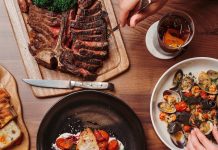
The popularity of plant-based diets has soared in recent years. The share of Americans who identify as vegetarian or vegan doubled from just 4% in 2015 to 8% in 2018. But despite this recent surge, many people still arenŌĆÖt quite sure what various diets entail and what the distinctions are among them. This guide to veggie vocab breaks down plant-based diets into bite-size pieces.
Vegetarian
Vegetarians, obviously, abstain from eating meat ŌĆö but not just meat according to the culinary definition of the word, which positions it opposite food categories such as poultry and seafood, but the meat of all animals. Some vegetarians commit to this diet for health reasons, but most do so out of concern for living creatures. As such, practitioners avoid other products, such as leather goods, whose production requires the death of animals. Vegetarians may, however, consume animal byproducts that arenŌĆÖt the result of animalsŌĆÖ deaths.
Vegan
A step above vegetarianism, a vegan diet does not allow for the consumption of any animal products or byproducts at all. The meat exclusion remains, but alongside it is the added elimination of eggs, milk, and honey. Most vegans believe animals should live free in their natural habitats, rather than suffering in confinement for the benefit of humans. Vegans, therefore, refrain from buying non-food animal byproducts, such
as wool and silk.
Lacto-vegetarian
Both of the next two diets fall midway between their better-known predecessors, vegetarianism and veganism. Each calls for the dietary exclusion of all types of animal products and byproducts, except for one. In the case of lacto-vegetarianism, the permitted exception is dairy. Meat, eggs, and honey, however, are prohibited.
Ovo-vegetarian
Like lacto-vegetarians, ovo-vegetarians do not consume animal products or honey, but they cut out dairy products while continuing to eat eggs.
Pescatarian
This one is more like a semi-plant-based diet, but itŌĆÖs so often mistaken for the others that we think it warrants clarification. People likely confuse vegetarianism and pescatarianism because, much like the former, the latter requires its adherents to forgo animal meat. But pescatarians make one big exception: seafood. Unlike vegetarians, most pescatarians adhere to a plant-centric diet not for humanitarian reasons, but for the health benefits. This explains their endorsement of seafood, which serves as a much leaner source of protein than most other options. ŌĆöAshley Winn╠²
Phony Bologna
Most faux meats are hit or miss, but these local in-house creations are sure to please. DonŌĆÖt forget to call ahead for the most up-to-date ordering options and hours during the coronavirus ▒Ķ▓╣▓į╗Õ▒│ŠŠ▒│”.╠²
By Page Gardner
As faux meatŌĆÖs popularity skyrockets, these metro Detroit restaurants are meeting the needs of local vegans and vegetarians and keeping it local by making their own meat and dairy alternatives in-house.
Inn Season Caf├® serves various plant-based burgers. Choose from a multi-grain patty, tempeh patty, and portabella mushroom cap. Inn Season Caf├®, 500 Fourth St., Royal Oak; 248-547-7916;
Cacao Tree Caf├® offers burritos, quesadillas, and salads made with its own seasoned nut ŌĆ£meat,ŌĆØ made of almonds, walnuts, and sunflower. Cacao Tree Caf├®, 204 W. Fourth St., Royal Oak; 248-336-9043;
Hiding in the back of El Club, E.C.ŌĆÖs Pizza is curing late-night pizza cravings with house-made vegan cashew ŌĆ£cheese,ŌĆØ which can be added to any pie . El Club, 4114 W. Vernor Hwy., Detroit; 313-279-7382; ╠²
|
| ╠² |
|









